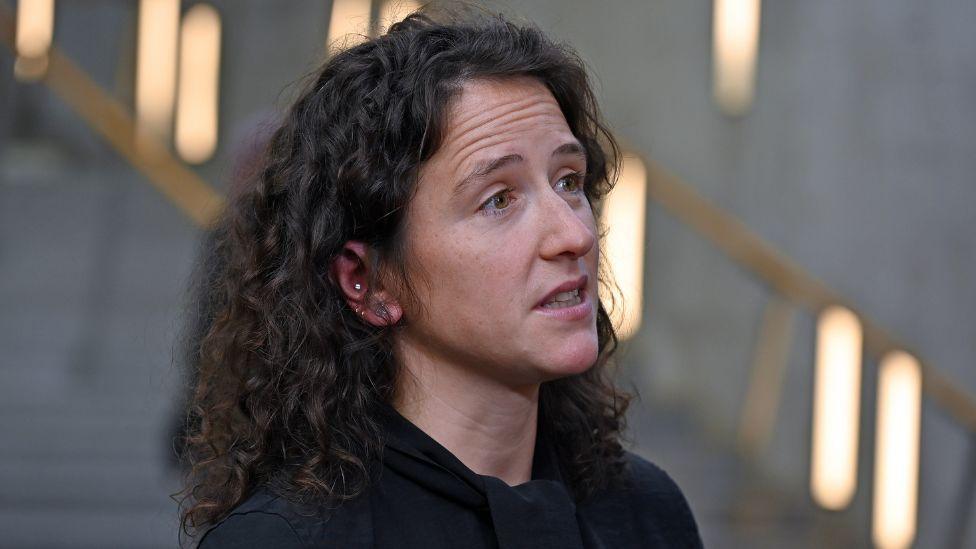MSPs pass land reform which could force break up of huge estates

The government wants to change the way land is managed in Scotland
- Published
The Scottish Parliament has passed land reforms which could force the break-up of some large estates.
The bill is designed to help reduce the concentration of rural land ownership among a small number of people, and to give communities a greater say in what happens on privately owned land.
It also seeks to increase opportunities for community buyouts of land and could allow for large estates to be split into smaller plots when they are put up for sale.
After three days of debates, with almost 400 amendments lodged, the Land Reform (Scotland) Bill was passed with 85 supporting, 28 in opposition and nine abstaining.
Why is land reform on the agenda in Scotland?
- Published6 November
Skye clan estate and historic castle put up for sale
- Published26 March
About half of Scotland's privately owned land is owned by just 420 people, according to research by former Green MSP Andy Wightman, external.
The government said its reforms would help address that imbalance.
Land reform campaigners welcomed some aspects of the bill, but said it did not go far enough.
Opponents warned the wide-ranging legislation would not work in practice and argued against government intervention in land transactions.
What is in the land reform bill?
The parliament backed the creation of a "transfer test", which would ensure that the sale or transfer of a large landholding (bigger than 1,000 hectares) cannot be completed without owners first applying to ministers for a decision on whether to sub-divide the land into "lots".
The bill also says that if someone wants to sell a large landholding, they must notify the government. Ministers would in turn notify community groups, offering them the chance to buy the land.
The legislation will compel owners of large landholdings to tell the surrounding community more about what happens on their land by publishing a land management plan. A failure to comply with this requirement could result in a fine of up to £40,000.
The legislation will also pave the way for the creation of a Land and Communities Commissioner to oversee, investigate and report on some of the bill's key aims.

Rural Affairs Secretary Mairi Gougeon steered the bill through parliament
Patrick Colquhoun, assistant chief executive of Luss Estates, which owns almost 50,000 acres of land around Loch Lomond, said the legislation could lead to an "infringement" on property rights.
Mr Colquhoun, who is also vice-chairman of Scottish Land and Estates, told the BBC's Scotcast podcast that he feared the definition of a large landholding could be reduced in future.
"Already the government are being pressed to reduce that down to 500 (hectares), then it's 200, then it's 10, then it's five and suddenly your plot at home, your garden ground could be under threat," he said.
Some lawyers have also raised concerns. Don Macleod, head of land and property at law firm Turcan Connell, described the bill, external as "junk", arguing that ambiguity over the definition of a large landholding could make the law "unworkable and impossible".
Community Land Scotland, which represents community landowners, said the bill, external was a "step forward" for land reform.
However, it warned that the measures did not "go far enough to meaningfully intervene in the land market and change landownership patterns".
'Lack of ambition'
Rural Affairs Secretary Mairi Gougeon told MSPs the reforms would improve how land is owned and managed for the benefit "of the many, not the few".
She told MSPs would allow communities to "breathe new life into rural communities".
Addressing concerns that the bill was not sufficiently radical, she said the reforms were "balanced and proportionate".
Scottish Conservative rural affairs spokesperson Tim Eagle described the bill as "unworkable and devastating", arguing it would "damage rural businesses and reduce the land available for rent".
Other parties argued the reforms did not go far enough.
Scottish Labour rural affairs spokeswoman Rhoda Grant said: "We support any improvements to Scotland's land management, but this weak bill is largely tinkering around the edges.
"The only significant change is to introduce untested lotting provisions and to take steps to stop off-market sales."
Green rural affairs spokesperson Ariane Burgess said ministers had shown a "lack of ambition to deliver the real land reform that is so vital".
Related topics
- Published26 March

- Published25 April
